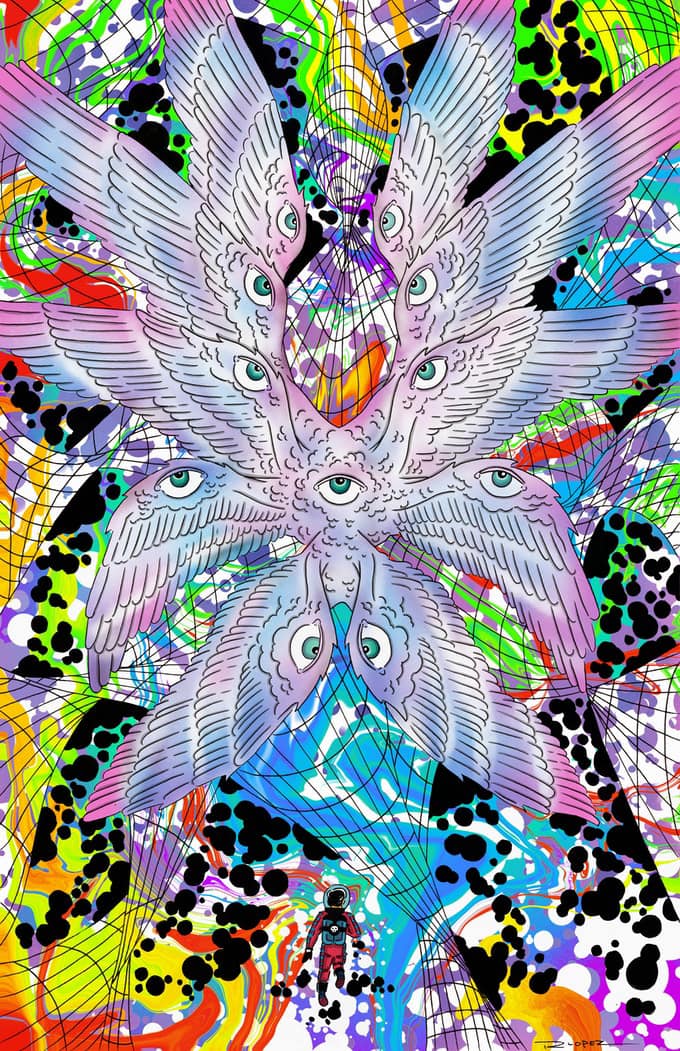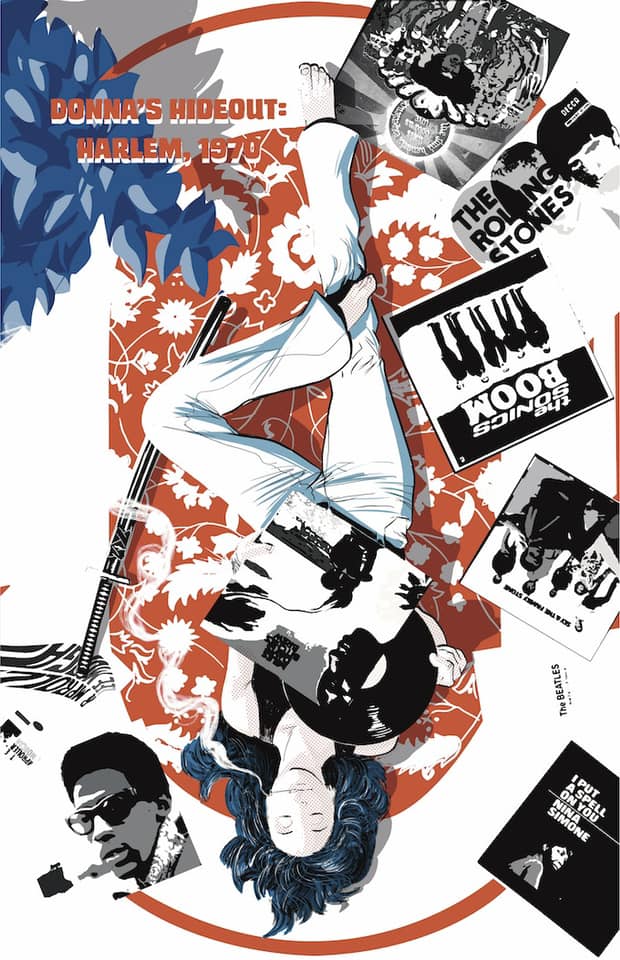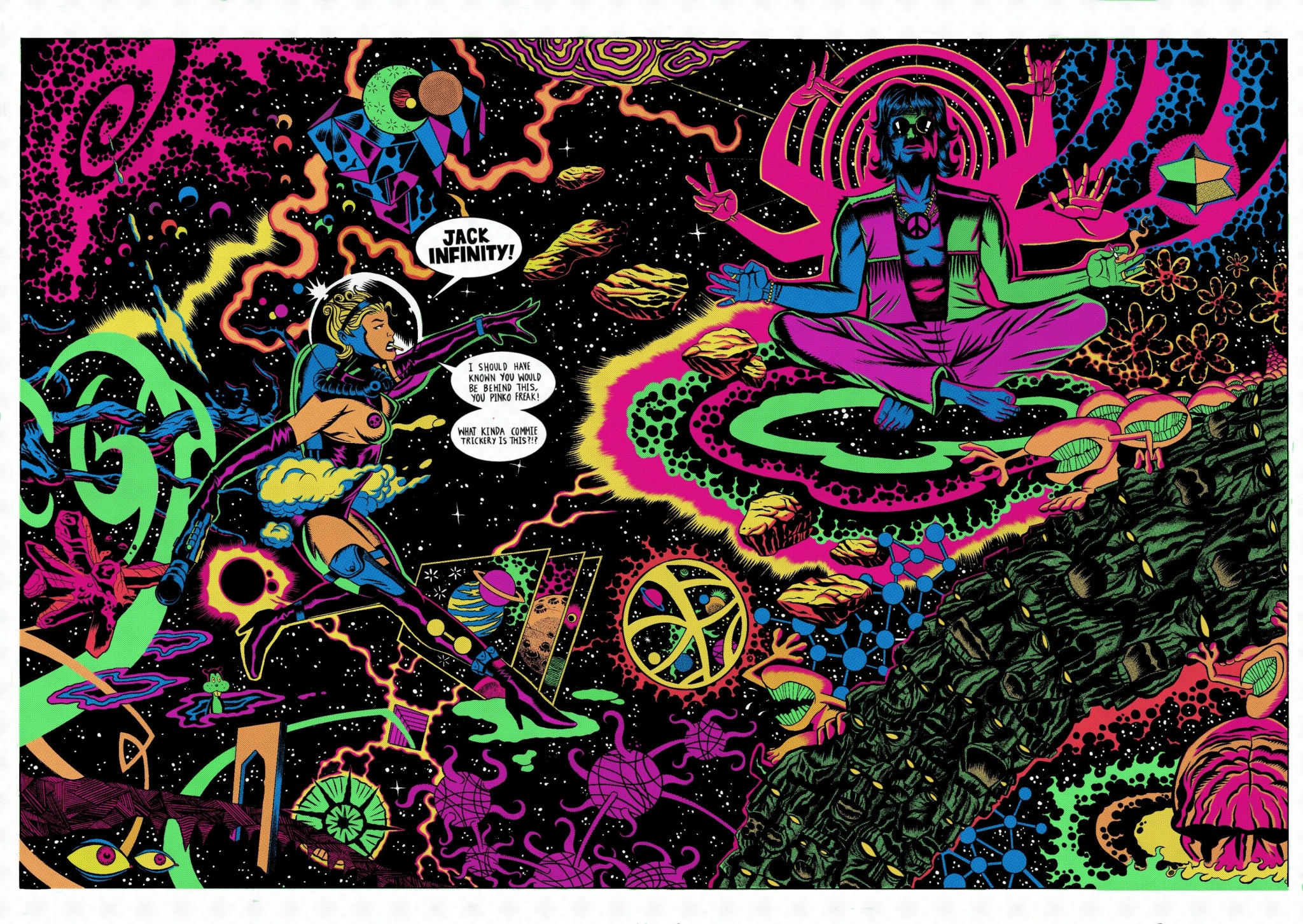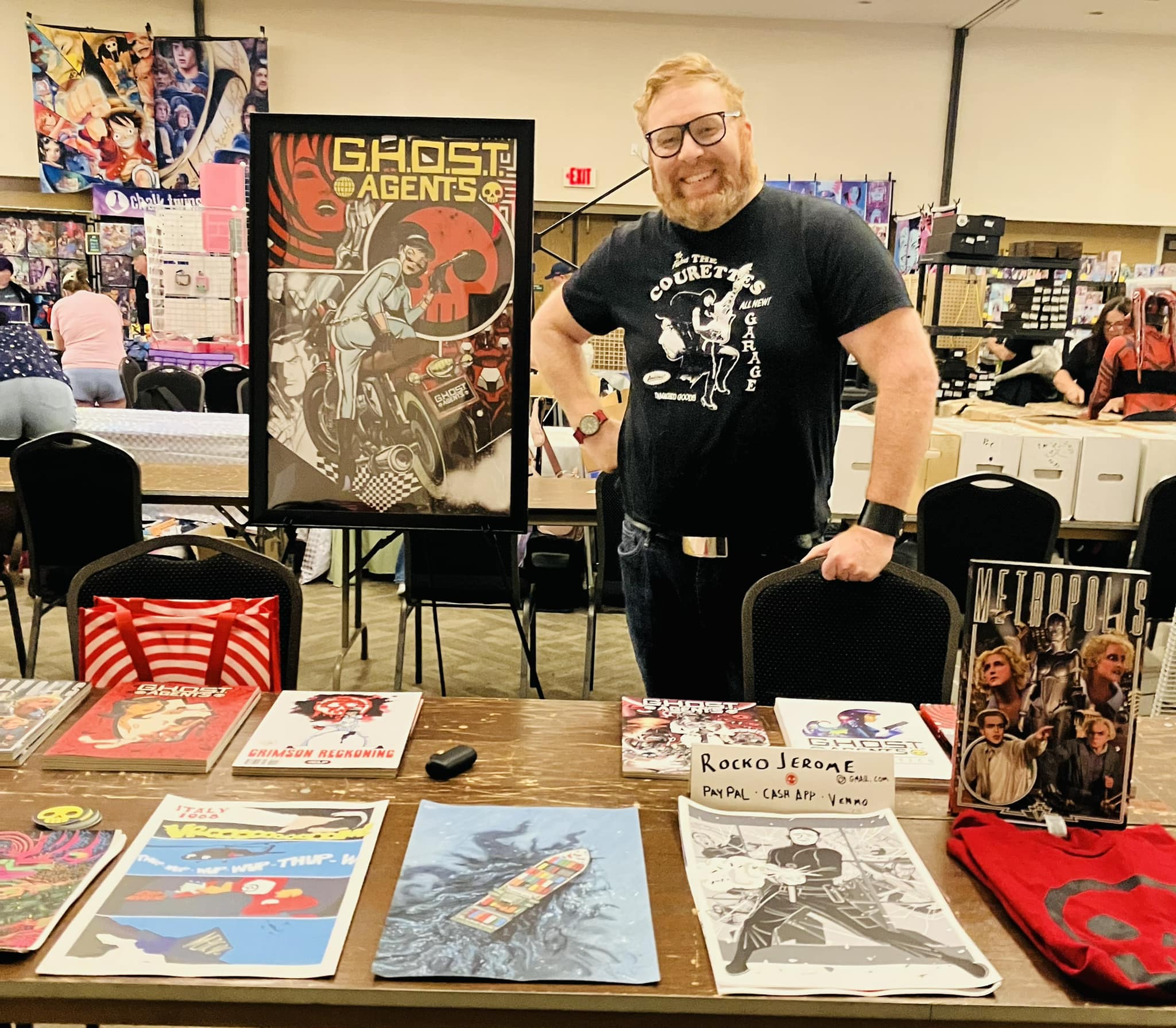We were lucky to catch up with Rocko Jerome recently and have shared our conversation below.
Hi Rocko, thanks for joining us today. Can you talk to us about a project that’s meant a lot to you?
I refer to myself as the Writer/Producer of a comic book called GHOST Agents. Even if you’re otherwise unfamiliar with what comics are about, you can certainly surmise that as a very visual storytelling medium and art form, it’s the people who do the drawing who are the most important part of the equation. My role is to help them succeed more than they might be doing without me. Otherwise, they don’t need me for anything.
I started production of GHOST Agents in 2021. We’ve had eight successful crowdfunding campaigns since and a total of nine different books. Some collectible toys, stickers, posters, even a 45 flexidisc GHOST Agents theme song from the Bellfuries, one of my favorite bands. I go through every door that opens and think of it all as something I’m getting away with doing.
How it happened: I have always loved comics since I was a very small kid. In adulthood, I found myself eking out a living as a writer. The two things were mutually exclusive until, back in 2020, during the darkest days of COVID, I happened to find myself serving as the project manager for what was later called the greatest bootleg comic of all time. Total accident. I joined a public Zoom meeting link posted in a Facebook group and started virtually meeting artists from around the world intent on doing something with the sudden surplus of time and anxious energy on their hands. They trusted me enough to be the editor of this book they wanted to make, and we were off to the races.
The thing I always say about Image Grand Design, the product of that crucible, is that it might have been better or it might have been worse, but without me, it wouldn’t be out yet. Anyone who ever did a group project in high school can tell you that they go sideways on you pretty easily. That would be you and maybe three other kids. IGD had thirty artists, each with a lot of talent and big ideas- some that wouldn’t jibe. We had to figure that out and make it work. Some other people still didn’t get along with other people. Some other artists couldn’t meet their own deadlines.
The primary memory I have about every boss I’ve had is whether or not I felt like they had my back in return for the hard work I gave them. I judge their merit entirely on my assessment of that equation. I don’t like to think of a good leader as a person with power. The workers should have the power. The leader should advocate for the workers, who should be able to remove the leader if they fail. That’s an idealized way of looking at it, and it’s rarely so in actual practice, but that’s what I expect of myself when I’m managing something.
Project management is really all about problem solving. When the problem was that some guys worked on this thing like it was their new job and some just didn’t, it wasn’t difficult for me to decide what to do from there. Where other similar projects to IGD took years to come out or were started around ours and still exist in limbo with some stage of incompleteness, ours is creeping towards the five-year anniversary of its release, and most involved went on to make other stuff.
The thing I went on to do is GHOST Agents. It’s everything I liked about IGD, minus everything I didn’t. IGD was based entirely on other people’s intellectual property (Hence: “greatest bootleg comic”), so once it was finished, we couldn’t openly sell it and make money. It was made up of a bunch of short stories that fed into each other, so until they all were done, the book couldn’t budge.
By contrast, GHOST Agents are characters I make up that artists bring to life, so we sell with impunity. The deadlines are hardline, but since I intend to keep driving GHOST Agents books as long as I live, it’s usually not that big a deal for an artist to miss one. It’s like the bus stop: you miss one, you catch the next one.
Also unlike IGD, in GHOST Agents, I write everything. I find artists whose work I like, find out what they want to draw, get high, write that for them, we find each other’s frequency, and make things we couldn’t have made without each other. It’s absolutely thrilling.

Looking back, are there any resources you wish you knew about earlier in your creative journey?
Crowdfunding is an absolute miracle for people who make things, but especially comics.
I find people sometimes ask me about how to handle the campaigns. I’m always happy to talk about that.
Here’s what we’ve learned in a nutshell:
1) Even with manufacturing in China and all the money that saves, the comics themselves are still your biggest expense. Posters are dirt cheap. Stickers and buttons aren’t too bad. That stuff is what keeps you solvent. You will want to think of yourself as being mostly in the poster business. Because the profit margin on posters is very wide, while books can be really tight. Here’s the best poster deal:
2) You want maybe five regular reward tiers. Load those in a way where the buyer will be inclined to say, “Well, I might as well go up a tier and get this $5 poster…”
The digital copy of the book should be first tier. And don’t sleep on that just because you might not care about it because there are foreign people and strictly digital people, and it costs you nothing to email that out.
Second tier is digital with physical. Third is probably with a poster, fourth is digital, physical, poster, button, and sticker. After that, you’re selling original art and/or whatever kinds of additional novelties you can come up with.
Also, in addition to those tiers, you want to have early bird exclusive items and prices to encourage early buy-ins. Have that expire after a week. I always do some exclusive buttons.
You’ll want to have one tier where it’s just $1000 just because, maybe, your grandma or someone could do that.
3) You have a big start and a big finish and the fight is to not have the lull between kill you. You fight that by always having something to reveal. A new page, a new angle, an interview, something.
4) Make the Kickstarter goal the lowest number you can possibly make it to cover your costs, because Kickstarter gives out this thing called “Projects We Love” where they endorse and promote you, and the only metric by which we can figure they choose to do that is how quickly you climb towards the goal.
5) Stretch goals never did shit for me.
6) If you’re thinking of doing some long series where they’re numbered sequentially and someone needs every issue to follow it, I recommend you just not do that. It’s so much to have to keep in print and on hand.
7) Launching a book that’s not finished yet is inviting a stress vampire into your home. Especially if you’re collaborating with someone else.
8) You want to launch your campaign on a Tuesday because people are hopefully caught up with life and work after Monday, and if you can make it end a few days after the first of a month when they’ve been paid, that’s great.
9) There are three key things:
-Don’t feel ashamed to push and promote. Anyone annoyed can unfollow.
-Everything you do, think it through.
-The biggest thing is, you never want to waste an engagement with your audience. They need to always know what you’re selling and how to buy it. Because there is SO MUCH SHIT competing for our attention constantly. A post about a thing you’re going to sell but aren’t yet just gets people used to ignoring you.
10)
Q:
When’s the best time to plant an oak tree?
A:
100 years ago.
Q:
When’s the second best time?
A:
Right now.

What do you think is the goal or mission that drives your creative journey?
GHOST Agents gets up-and-coming comic artists published, promoted, and paid. For some, it’s their first time for all three. I want it to be a stepping stone to bigger things for all of them. The guys I work with now, I want to be no longer able to afford in five years. And whoever I’m working with then, I want them to be beyond my reach five years after that and so on.

Contact Info:
- Website: https://GHOSTagents.net
- Instagram: @RockoJerome.GHOSTagents
- Facebook: Rocko Jerome

Image Credits
Rick Lopez
Ben Perkins
Chris Anderson
Barry Tan


